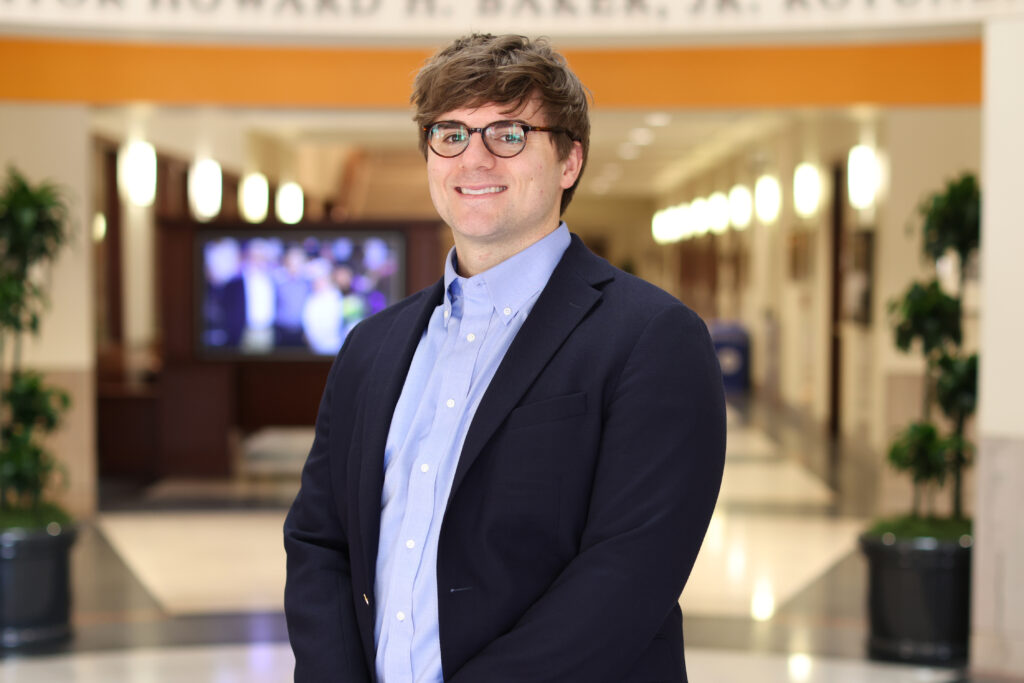Brad Finney, assistant professor of law at the Winston College of Law, was attracted to the versatility of a law degree, because there are so many sectors and industries in which a person could practice. In particular, he liked the idea of environmental law as one path through which he could make a positive difference in the world.
As an undergrad studying at the Haslam College of Business, Finney heard professors speak of “conscious capitalism”—of responsible, sustainable business models, and giving back to the community. These concepts dovetailed well with Finney’s interest in environmental issues.
“I think just growing up in my generation, we were talking about the environment from at least middle school onward,” Finney says. “It was interesting to think about businesses taking the lead, not just waiting for government mandates.”
It was during summer internships and talking with some law professionals that he began to realize how all the issues that interested him had important, legal angles. Finney graduated in 2012, with an eye toward law school.
His opinion of Winston Law was already high, thanks to previous interactions with students and faculty. Although he toured several other potential law schools, Winston Law’s welcoming atmosphere won him over. Once a student there, his early, positive impressions of the school were validated. Everyone was collegial, and the professors invested in his success.
“I was a first generation law student, so I had no idea what a career in law looked like, much less in the environmental space,” he says. “There were two professors, Dean Rivkin and Becky Jacobs, who were very influential on my career. They were patient and kind, and giving of their time in answering my questions. They helped me figure out what a career in environmental law would look like.”
He also discovered a love of writing and research, and took directed research courses under Jacobs. Through those courses, Finney and Jacobs co-authored papers that saw publication in energy law and environmental law journals. Finney has authored numerous other papers since 2017.
After earning his JD, Finney joined the firm of Norton Rose Fulbright in Houston, and later worked as an associate of Steptoe & Johnson in Washington D.C. Between those experiences in law practice, Finney held clerkships at two U.S. District Courts in Tennessee—both under judges who were Winston Law alumni.
“The first year, I clerked in the Eastern District for Judge Pam Reeves, who passed away soon after my clerkship for her ended,” Finney says. “She was an outstanding person. I learned a ton from her as far as the lifecycle of a case and what happens in the courtroom. But I probably learned more from watching the way she interacted with everyone from the cleaning staff all the way up to circuit or appellate judges. She was kind to everyone, and really embodied what it means to be a federal judge in the best way.”
His subsequent clerkship in the Western District for Judge Daniel Breen was an equally positive experience.
“I think the biggest thing I learned from Judge Breen was writing,” Finney says. “He was an excellent writer. In my two years clerking for him, I think my writing improved just because I would get his edits back on the writings I did for him, and that was extremely helpful. I could always come into his chambers and talk to him about things; I’m still really close with him and his staff.”
Winston Law hired Finney in 2024 as an assistant professor specializing in agricultural, energy, environmental, and property law. Although it was his first faculty position, he says colleagues were very open and helpful.
“I cannot undersell how much the faculty has been helpful to me and how much I love interacting with them,” he says. “Not just on a personal level, but also that they’ve been willing to help me put together course materials, answer any questions I have. This is my first teaching job, so I had a lot of questions. I was always met with open doors and people willing to help.”
Finney sees his position as an opportunity to invest in students’ success, and to promote the type of encouraging atmosphere that first attracted him to the college.
“Winston Law is such a unique environment, because everyone is so collegial,” he says. “I really enjoy interacting with the students and helping them figure out what they want to do. It’s great to watch students wrestle with a difficult topic and go from knowing very little about it to really understanding it from different angles. It’s wonderfully rewarding.”
